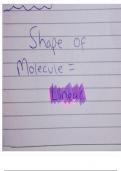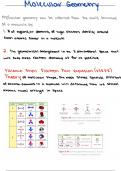Electron domain geometry - Study guides, Class notes & Summaries
Looking for the best study guides, study notes and summaries about Electron domain geometry? On this page you'll find 37 study documents about Electron domain geometry.
Page 3 out of 37 results
Sort by
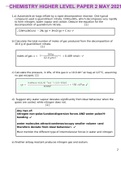
-
CHEMISTRYHIGHER LEVELPAPER 2
- Exam (elaborations) • 23 pages • 2022
-
- $5.49
- + learn more
1.a) Automobile air bags inflate by a rapid decomposition reaction. One typical compound used is guanidinium nitrate, C(NH2)3NO3, which decomposes very rapidly to form nitrogen, water vapour and carbon. Deduce the equation for the decomposition of guanidinium nitrate. [1] . C(NH2)3NO3 (s) → 2N2 (g) + 3H2O (g) + C (s) b) Calculate the total number of moles of gas produced from the decomposition of 10.0 g of guanidinium nitrate. [1] moles of gas = « 5× 10.0 g 122.11gmo l −1=¿...
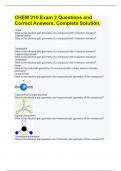
-
CHEM 210 Exam 2 Questions and Correct Answers, Complete Solution.
- Exam (elaborations) • 8 pages • 2024
-
- $11.48
- + learn more
CHEM 210 Exam 2 Questions and Correct Answers, Complete Solution. Linear What is the electron-pair geometry of a compound with 2 electron domains? Trigonal planar What is the electron-pair geometry of a compound with 3 electron domains? Brainpower Read More Tetrahedral What is the electron-pair geometry of a compound with 4 electron domains? Trigonal bipyramidal What is the electron-pair geometry of a compound with 5 electron domains? Octahedral What is the electron-pair geometry o...
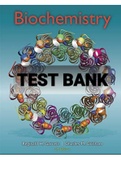
-
Exam (elaborations) TEST BANK FOR Garrett & Grisham's Biochemistry 5th Edition By Jemiolo D.K. and Theg S.M. (Student Solutions Manual, Study Guide and Problems Book)
- Exam (elaborations) • 639 pages • 2021
-
- $15.99
- 4x sold
- + learn more
TEST BANK FOR Garrett & Grisham's Biochemistry 5th Edition By Jemiolo D.K. and Theg S.M. (Student Solutions Manual, Study Guide and Problems Book) Student Solutions Manual, Study Guide, and Problems Book Prepared by David K. Jemiolo Vassar College Steven M. Theg University of California, Davis Australia • Brazil • Japan • Korea • Mexico • Singapore • Spain • United Kingdom • United States Biochemistry FIFTH EDITION Reginald H. Garrett University of Virginia Charles...
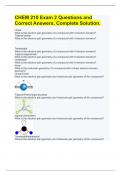
-
CHEM 210 Exam 2 Questions and Correct Answers, Complete Solution.
- Exam (elaborations) • 8 pages • 2024
-
- $9.99
- + learn more
CHEM 210 Exam 2 Questions and Correct Answers, Complete Solution. Linear What is the electron-pair geometry of a compound with 2 electron domains? Trigonal planar What is the electron-pair geometry of a compound with 3 electron domains? Brainpower Read More Tetrahedral What is the electron-pair geometry of a compound with 4 electron domains? Trigonal bipyramidal What is the electron-pair geometry of a compound with 5 electron domains? Octahedral What is the electron-pair geometry o...
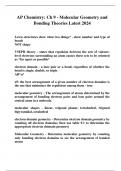
-
AP Chemistry: Ch 9 - Molecular Geometry and Bonding Theories Latest 2024
- Summary • 9 pages • 2024
-
Available in package deal
-
- $8.69
- + learn more
AP Chemistry: Ch 9 - Molecular Geometry and Bonding Theories Latest 2024 Lewis structures show what two things? - show number and type of bonds NOT shape VSEPR theory - states that repulsion between the sets of valence-level electrons surrounding an atom causes these sets to be oriented as *far apart as possible* electron domain - a lone pair or a bond, regardless of whether the bond is single, double, or triple AB*n* t/f: the best arrangement of a given number of electron domains ...
A Level Chemistry - Shapes of Molecules Flashcards - 18/07/2024 Valence shell electron pair repulsion theory, VSEPR, molecular structure.
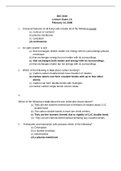
-
BIO 3100 Test Banks
- Exam (elaborations) • 542 pages • 2022
-
Available in package deal
-
- $14.49
- + learn more
BIO 3100 Test Banks BIO 3100 Lecture Exam I-A February 14, 2008 1. Universal features of all living cells include all of the following except: (a) nucleus or nucleoid (b) plasma membrane (c) cytoplasm (d) centrosome 2. An open system is one (a) that exchanges neither matter nor energy with its surroundings plasma membrane (b) that exchanges energy but not matter with its surroundings. (c) that exchanges both matter and energy with its surroundings. (d) that exchanges matter but n...
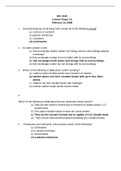
-
BIO 3100 Test Banks (A collection of the most tested Questions with Verified Answers) LATEST VERSION 2022.
- Exam (elaborations) • 542 pages • 2022
-
Available in package deal
-
- $14.49
- + learn more
BIO 3100 Test Banks BIO 3100 Lecture Exam I-A February 14, 2008 1. Universal features of all living cells include all of the following except: (a) nucleus or nucleoid (b) plasma membrane (c) cytoplasm (d) centrosome 2. An open system is one (a) that exchanges neither matter nor energy with its surroundings plasma membrane (b) that exchanges energy but not matter with its surroundings. (c) that exchanges both matter and energy with its surroundings. (d) that exchanges matter but not energy with i...
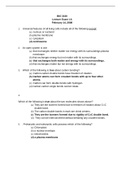
-
BIO 3100 Test Banks (A compilations of past exams, questions and verified Answers)
- Exam (elaborations) • 542 pages • 2022
-
Available in package deal
-
- $15.49
- + learn more
BIO 3100 Test Banks BIO 3100 Lecture Exam I-A February 14, 2008 1. Universal features of all living cells include all of the following except: (a) nucleus or nucleoid (b) plasma membrane (c) cytoplasm (d) centrosome 2. An open system is one (a) that exchanges neither matter nor energy with its surroundings plasma membrane (b) that exchanges energy but not matter with its surroundings. (c) that exchanges both matter and energy with its surroundings. (d) that exchanges matter but n...
explaining why molecules are 3 dimensional using their electron domain geometry and molecular geometry

How did he do that? By selling his study resources on Stuvia. Try it yourself! Discover all about earning on Stuvia



